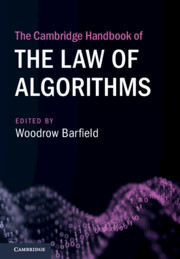Book contents
- The Cambridge Handbook of the Law of Algorithms
- The Cambridge Handbook of the Law of Algorithms
- Copyright page
- Contents
- Figures
- Tables
- Notes on Contributors
- Foreword
- Preface
- Acknowledgements
- Abbreviations
- Part I Introduction and Setting the Stage for a Law of Algorithms
- Part II Business, Regulations, and Decision-Making with Algorithms
- 6 Algorithms and Contract Law
- 7 Algorithms, Agreements, and Agency
- 8 Algorithmic Governance and Administrative Law
- 9 Discrimination in the Age of Algorithms
- 10 Algorithmic Competition, Collusion, and Price Discrimination
- 11 The Rule of Law and Algorithmic Governance
- 12 Governance of Algorithms
- 13 From Rule of Law to Statute Drafting
- 14 Algorithmic Decision Systems
- 15 From Legal Sources to Programming Code
- Part III Intellectual Property and Algorithms
- Part IV Criminal Law, Tort Issues, and Algorithms
- Part V Constitutional Law, Human Rights, and Algorithms
- Part VI Applications and Future Directions of Law and Algorithms
- Index
10 - Algorithmic Competition, Collusion, and Price Discrimination
from Part II - Business, Regulations, and Decision-Making with Algorithms
Published online by Cambridge University Press: 19 October 2020
- The Cambridge Handbook of the Law of Algorithms
- The Cambridge Handbook of the Law of Algorithms
- Copyright page
- Contents
- Figures
- Tables
- Notes on Contributors
- Foreword
- Preface
- Acknowledgements
- Abbreviations
- Part I Introduction and Setting the Stage for a Law of Algorithms
- Part II Business, Regulations, and Decision-Making with Algorithms
- 6 Algorithms and Contract Law
- 7 Algorithms, Agreements, and Agency
- 8 Algorithmic Governance and Administrative Law
- 9 Discrimination in the Age of Algorithms
- 10 Algorithmic Competition, Collusion, and Price Discrimination
- 11 The Rule of Law and Algorithmic Governance
- 12 Governance of Algorithms
- 13 From Rule of Law to Statute Drafting
- 14 Algorithmic Decision Systems
- 15 From Legal Sources to Programming Code
- Part III Intellectual Property and Algorithms
- Part IV Criminal Law, Tort Issues, and Algorithms
- Part V Constitutional Law, Human Rights, and Algorithms
- Part VI Applications and Future Directions of Law and Algorithms
- Index
Summary
Rapid, recent technological change has brought forward a new form of “algorithmic competition.” Firms can and do draw on supercharged connectivity, mass data collection, algorithmic processing, and automated pricing to engage in what can be called “robo-selling.” But algorithmic competition can also produce results that harm consumers. Notably, robo-selling may make anticompetitive collusion more likely, all things being equal. Additionally, the possibility of new forms of algorithmic price discrimination may also cause consumers to suffer. There are no easy solutions, particularly because algorithmic competition also promises significant benefits to consumers. As a result, this chapter sets forth some approaches to each of these issues, necessarily tentative, to address the changes that algorithmic competition is likely to bring.
Keywords
Information
- Type
- Chapter
- Information
- The Cambridge Handbook of the Law of Algorithms , pp. 199 - 208Publisher: Cambridge University PressPrint publication year: 2020
